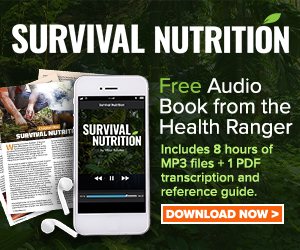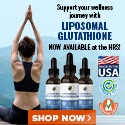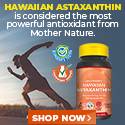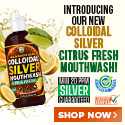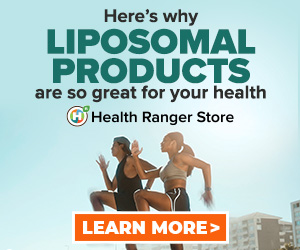
Interview with Ralph Wilson on email marketing and e-commerce
 Wednesday, March 15, 2006 Wednesday, March 15, 2006by Mike Adams, the Health Ranger Editor of NaturalNews.com (See all articles...) Tags: web marketing, e-commerce, search engines |
- Newly released JFK files reveal Pentagon's role in creating Lyme disease and covid in the same lab
- Discovery of vast underground city beneath Giza pyramids challenges human history
- Black cumin seed oil emerges as a powerful ally against breast cancer and chronic inflammation
- Sugar-free deception: Artificial sweeteners hijack hunger signals, fuel obesity epidemic, study warns
- Catastrophic 7.7 earthquake devastates Myanmar and Thailand; death toll could reach 100,000
- Kiss Your Genetic Privacy Good-Bye! 23andMe Gets Green Light to Sell Your Intimate Genetic Details to Anyone They Want
- AI breakthrough slashes celiac disease diagnosis time from months to minutes
- Europe braces for WAR as EU urges citizens to STOCKPILE FOOD, in latest provocations with Russia
- Aluminum pollution: A silent threat to human health
- Thomas Massie’s Dual Loyalty Disclosure Act aims to restore American sovereignty by cracking down on foreign influence in Congress
- Dr. Suzanne Humphries makes bombshell appearance on Joe Rogan podcast, exposing vaccine industry deception back to POLIOMYELITIS
- The cancer fear industry: How big pharma profits from panic-and what natural alternatives offer
- The mighty Eggplant: An underrated superfood with ancient roots
- 200 Tesla showrooms bracing for Saturday protests as movement against Musk escalates
- Is the vaccine-autism debate reopening? Washington Post sparks controversy with preemptive hit piece on David Geier
- A handful of pecans a day could keep heart disease at bay, study finds
- The great crypto power struggle: How technocrats and governments are reshaping global finance
- Trump administration reportedly preparing for military strikes on Iran, raising fears of escalation
- Newly released JFK files reveal Pentagon's role in creating Lyme disease and covid in the same lab
- Analysis: The coming economic collapse, a mass uprising and Trump's three secret weapons to halt the growing revolt
- Trump nominates VACCINE ZEALOT Susan Monarez to lead the CDC, sidelining RFK Jr.'s reform efforts
- Trump's greatest betrayal so far: Accelerating Middle East wars, silencing dissent, and serving Zionist masters
- Dr. Mike Yeadon releases 15-minute testimony - WATCH - about genocidal intent of COVID “vaccines”
- Festive flavors: The sweet history, nutritional profile and health benefits of pecan pie
- Elon Musk: Aliens could be here on Earth RIGHT NOW
- Big Pharma's $8 Billion bribery scheme exposed: how doctors are pushed to prescribe junk science, not heal
- 5 Simple steps to boost your brainpower: How to strengthen executive function in a distracted world
- Trump reverses course on Gaza plan, says “nobody is expelling Palestinians”
- A lack of integrity in Academia: Harvard professor found GUILTY of fraudulent research to promote CRT theory
- Reclaim your health: How midlife exercise reverses years of inactivity
- Survival 101: Effective EMF blocking techniques
- Florida takes a stand: DeSantis proposes permanent ban on mRNA vaccine mandates
- Sugarcane extract superior to cholesterol-lowering drugs?
- California's social media censorship law struck down: A victory for free speech or a threat to online safety?
- OpenAI whistleblower who dissented against how the company trained ChatGPT found dead
- EPA advisor admits the agency is funneling billions to climate groups ahead of Trump’s return to White House
- EPA advisor admits the agency is funneling billions to climate groups ahead of Trump’s return to White House
- Newly released JFK files reveal Pentagon's role in creating Lyme disease and covid in the same lab
- California's social media censorship law struck down: A victory for free speech or a threat to online safety?
- Dr. Mike Yeadon releases 15-minute testimony - WATCH - about genocidal intent of COVID “vaccines”
- The Health Ranger releases “Vaccine Zombie” song and music video, using AI-animated zombies for the music video
- The pandemic as a tool for INDOCTRINATION: Understanding “The Indoctrinated Brain” by Dr. Michael Nehls
- Florida takes a stand: DeSantis proposes permanent ban on mRNA vaccine mandates
- “Why we influenced the 2020 elections”: Facebook files reveal the coordinated effort to bury the Hunter Biden laptop story
- Mike Adams releases country western hit single: Goin’ Back in Time is Comin’ Home
- Mike Adams releases music poetry sensation: A Child of God
- Unpacking the Lies That We’ve Been Fed – new song and music video released by Mike Adams, the Health Ranger
- Michigan sheriff announces criminal investigation into 2020 election crimes, Dominion Voting Systems
- Migrants are taking advantage of recent hurricanes to scam residents and loot their homes
- House Intelligence Committee calls for the ARREST and PROSECUTION of Dr. Anthony Fauci
- RFK Jr. clears key hurdle: Sen. Susan Collins backs controversial HHS nominee, signaling a new era for health policy
- Rep. Nancy Mace introduces bill to ban biological males from female facilities on federal property
- Peter Rost exposes Big Pharma corruption in his book “The Whistleblower: Confessions of a Healthcare Hitman”
- Mike Adams releases new song and music video: Nothing More Disgusting Than a Globalist
- Red Cross issues warning to stop blood plasma donations from vaccinated people
- Scientists confirm: GENIUS brain function can be spontaneously unleashed in humans without any apparent cause
- EPA advisor admits the agency is funneling billions to climate groups ahead of Trump’s return to White House
- HYSSOP: What research reveals about the health benefits of this ancient holy herb
- Two containers with completed ballots fall out of truck in Florida
- Fully vaccinated about to see “tsunami” of illness and death, warns virologist
- Global leaders unite to clamp down on “misinformation” with UN-backed Cascais Declaration
- BREAKING: 2025 NDAA authorizes mandatory military draft of WOMEN across America… as Pentagon pursues global NUCLEAR war with both Russia and China at the same time
- Michael Yon warns of a ZIONIST TAKEOVER in Trump’s second administration
- BOMBSHELL: DNA testing kits are a SCAM to develop ethnic-specific bioweapons
- Ozempic and Wegovy weight loss drugs are injectable LIZARD VENOM PEPTIDES that may unleash a devastating wave of organ failure… side effects align with symptoms of SNAKE BITES
- Israeli soldiers accused of even more torture and abuse in the West Bank
- These 13 countries just signed an agreement to engineer a global FAMINE by destroying food supply
- NASA admits that climate change occurs because of changes in Earth’s solar orbit, and NOT because of SUVs and fossil fuels
- RFK Jr. clears key hurdle: Sen. Susan Collins backs controversial HHS nominee, signaling a new era for health policy
- Sermon 30: How Jesus reveals Caesar’s FAKE CURRENCY and FALSE AUTHORITY
- Coriander seeds: Ancient medicine backed by modern science
- Arizona officials claim Maricopa County needs 10-13 days to tabulate results of the election
Wilson: Thank you.
Mike: For those who may not be familiar with your site and what you do, can you give a brief introduction of what you cover in this industry?
Wilson: Well, I started back in 1995 when the industry was very tiny. I remember linking to all the web articles I could find, which was about 20 articles back in November of 1995. We now link to our site 12,500 resources. We certainly are not exhaustive, but our site has really become the center for internet marketing, e-commerce and web marketing on the internet. We provide a huge amount of information. We have a free version and a pay version of Web Marketing Today. The accumulation of all the writing over the years makes the site pretty big.
Mike: So the free version of Web Marketing Today is something people can sign up for, correct?
Wilson: Yes, it comes out weekly. I try to keep it short purposely, so it is readable and quickly readable. When people sign up, I give them three free e-books as a way of saying thank you for subscribing.
Mike: That by itself is a great online marketing strategy.
Wilson: I have learned that when you give an incentive for people taking action, more of them will take the action.
Mike: Sure. I know you cover a lot of areas of online marketing -- search engine optimization, landing pages and so on -- but today I would like to focus on email marketing, and specifically permission email marketing and maybe get into some spam issues as well. Let me start by asking you a question that keeps shifting around on all of us in the industry: Plain text or html? What is your answer today?
Wilson: Well, I think the ultimate answer is to let the recipient decide which of the two they prefer and then send them their preference. When I send my newsletter to people, I pre-check html, because it is my preference. My experience is that when AOL subscribers receive a text message, none of the hyperlinks show up as hyperlinks. They show up as a straight URL that they have to copy and paste into their web browser, and those that are new don't know how to copy and paste. I would prefer to send out html, though I respect the preference of the person who receives it. These days, some federal and state governments and large corporations don't let html through their firewalls, because the things that might come with it could infect their machines. So you want to have it look the way you want it as text. Give people that opportunity or they will see a stripped down version of your html.
Mike: What about the issue of email clients likes Outlook Express?
Wilson: I know the image panel for 2003 doesn't show images by default, so you would have to turn it on. This means marketers should not rely upon the image to carry the whole message. As I have looked at commercial email that comes to me, some of them are just one big graphic, and I don't think that will work anymore. I think the graphic should complement the text message, and we need to use the features of html rather than just a big graphic. However, one of the reasons that I prefer html is that the click rate is likely to be twice that of a text message. So, if I can get twice the click-through rate, html is my preference, even though the graphics are iffy.
Mike: So you are seeing those click-through rates remain steady even today?
Wilson: I have not tested it recently, but I have heard this from those who have tested it recently, and I think there is a consistently better response through html. My own tests have found this out and others as well.
Mike: Interesting. The whole medium of email has been under fire recently, and people are saying they are avoiding email because it is too polluted and there is too much spam involved. Now we're seeing failure in negotiations for anti-spam technology. Where do you think email is headed? Is it a discredited medium from here on, or what is going to happen?
Wilson: Well, it is hard to predict the future. There are several things, I think. One is, I think we should all write our congressman and insist that the FTC enforce the CAN-SPAM Act. I think if the CAN-SPAM Act were enforced, we would see the amount of spam decrease. To the best of my knowledge, the federal government has not enforced this, or if they have, they have been very quiet about it. There have been a couple of ISPs that have filed lawsuits against a couple hundred of the most egregious spammers. As far as the federal government enforcing their law, they haven't done it. Until they do, we aren't going to see much change. We need to loudly insist that the act be enforced and some money be put behind enforcing it. Right now, you're right; the medium is under assault. I am a newsletter publisher, and it is difficult for me to get my messages delivered. I received an email from someone who subscribes to Comcast, and he was complaining to Comcast that they were constantly dumping my newsletter email into his spam folder even though it is a double opt-in list that he wants to receive. It is difficult to send email and make sure it is received. If it is received, people are sorting out so much from their inbox that they may miss something. However, I don't think email is going away anytime soon. It may be not as effective as it has been in the past as a commercial medium, but I think it is mainstream and will continue to be mainstream. There are no effective alternatives yet for email. Some people have touted the xml version of a website that can be sent to people. But none of that is really taking care of messaging from person to person. We need to insist that the law is enforced and insist our internet providers send us what we request, and that they put our addresses on the white list.
Mike: I know a lot of people in the industry looked at this CAN-SPAM Act and said it was a feel-good piece of legislation, but it wouldn't have much impact, and it seems to be panning out that way.
Wilson: I don't think that is quite fair. It is not an opt-in piece we want to see; it's an opt-out piece of law. However, if it were enforced, it would clean things up dramatically.
Mike: Do you think it is just a matter of funding, that the FTC needs more resources?
Wilson: I don't know why they aren't enforcing it. They probably don't have enough people on the task. There may be other priorities. To people like me, whose life's blood is email, I think it is vital.
Mike: Let's go to the side of professional email marketers for a moment. You have written a couple of books on email marketing?
Wilson: One, called The E-Mail Marketing Handbook.
Mike: In that book, you tell people how to get started from the ground up. So, a question to you: What are people doing wrong with their current email marketing activities that they could easily correct?
Wilson: Before I comment on that, let me go back and make one more comment on spam. You had asked about the future. I think in the future commercial email marketers, like myself, are going to have to pay into some certified sender program, and certified senders will be put on white lists. I think that is what the future is going to be. That is why it is so important for Internet marketers and emailers to make sure we are scrupulous about how we send out emails. I recommend double opt-in and confirmed opt-in email. I think it is going to come down to being certified as one of the good guys to get our email through.
Mike: Essentially that would be like adding friction or postage to outbound email.
Wilson: IronPort has a bond that is posted, and if there are complaints, then money is taken away from the bond. In some fashion or another, it is a certification rather than a postage. I think it was Microsoft that introduced the idea of postage. Foretelling the future is risky business, but that is what I see coming down the pike. That is why I think using confirmed opt-in now and building a good reputation as an email marketer is going to be important.
Mike: You use the word reputation, and I agree. The problem is when ISPs look at an inbound email, they have no way of knowing the reputation of the sender.
Wilson: They do in some fashion. There is a company out there called habeas.com, and they have a header for a license you can use.
Mike: Is that the poetic header?
Wilson: That is the poetic header, with the idea that they can copyright a poem; they can trademark their term of habeas. So if someone tries to counterfeit the header, they can be sued. I don't know if Habeas is going to take off as one of the leaders or not.
Mike: Since you bring that up, I have to ask you about that. Are any ISPs paying attention to that header?
Wilson: One of the most widely used spam filters is Spam Assassin. Spam Assassin gives a 4.6-point credit for anyone using the habeas header. Since the default is five points to be credited to spam, you can take off 4.6 points and that means you have a pretty good chance of getting your email through, even though you might have some wording that would send up some red flags. I use the word email marketing in my newsletter, and that happens to send out a red flag to Spam Assassin and other word-based filters. So having a habeas heading helps, but to have it work well, it has to have momentum and be seen all over the internet as a mark of approval and certification of someone that is a legitimate and ethical emailer.
Mike: It has to be enforced. In other words, the habeas company has to be filing lawsuits.
Wilson: They will have to defend their trademarks and copyrights vigorously. The reason I like the system is because they have a vested interest in suing people. Not only does it protect them, but they can make big bucks on copyright infringement. The IronPort Bond Sender program has gotten some momentum now, because I understand that Yahoo and Hotmail are using it. Which of the two are going to lead the market is yet to be seen, but I think this is one of the directions things are going to go to get better.
Mike: Just to play the devil's advocate on any payment issue, some of the critics of this type of approach have said it sounds great here in the United States, but how about countries where wages are low and they can't afford to be certified, yet they are sending out important information? How do they fit into the system?
Wilson: They may not get on white lists, so it is going to be harder for their email to get through, but it is hard right now for anyone's email to be delivered. I don't know if this is the best solution or the only one. It is a solution that is going to work in the U.S. It will cost some money to provide some checking up on people. I'm certainly open to other solutions.
Mike: It is tough to look into the crystal ball.
Wilson: Mine is cloudy right now.
Mike: Recently, we saw headlines about the failure of the sender ID idea -- not so much an anti-spam, but more an anti-phishing solution. The working group has been disbanded, and Microsoft patent issues got in the way. It is dead, and that's a great setback.
Wilson: I never liked that approach anyway. It sounded like a moneymaker for Microsoft.
Mike: Probably. That's what happens.
Wilson: I'm not a Microsoft hater in any way, but it seemed like a pay-a-toll approach, which I don't think is appropriate. To pay for a license is something different; you are paying someone to check and see that you are legitimate. You then have a license that you could potentially lose. But to pay for every email that goes out is changing the economy of the internet in a way that I don't think is healthy.
Mike: Do you think there will be a technical approach or legislative approach? What do you think the authorities on the internet are going to do next?
Wilson: One of the happenings is a technology that authenticates the sender of the email. Right now, everyone is pretending to be someone else in order to hide his or her true identity. It is not the final solution, but it is a solution.
Mike: Let's get back to your e-book on email marketing. What is the title of it again?
Wilson: The E-Mail Marketing Handbook.
Mike: The E-Mail Marketing Handbook is something that people can find on wilsonweb.com?
Wilson: Right.
Mike: In there, do you tell people how to get started?
Wilson: Yes. One of the things I advocate strongly for businesses and organizations is to start a newsletter even though you are small and just getting started. The reason is this: Let's say you put a lot of effort into getting people to your site, but your conversion rate for what you sell is 1 or 2 percent. That means that 98 percent of the people get away without you having any way to market to them again or have any indication of who they are. So, if you have a newsletter with interesting content, I think it is quite possible to get 10 or 20 percent of the people that visit your web site to sign up for it, and then you can build a relationship with them. When they are ready to buy a certain kind of product, they know you. You have to ask, "What kind of regular publication might I put out?" It could be product updates or product information. For others, it might be interesting articles on whatever field they might be in. I think people should make them short -- 500 words or less. For most email publications, it is a good, round rule of thumb. People don't have time to read a lot because they are sorting through emails, maybe even spam. I encourage you to not send out long emails. Then I think you need to set up a frequency. I think once a month is the outside limit, because you need to be sending often enough for them to remember you. If they don't remember you, you will get deleted. I don't think once a week is appropriate, unless you have awfully good content.
Mike: There are some who send even more frequently than that -- like ClickZ.
Wilson: There are certainly exceptions to the rule, but for many people getting started, monthly is a good thing to aim at. There is some discipline in writing a monthly newsletter.
Mike: How can people get started simply and easily even if they don't have a lot of technical knowledge?
Wilson: Well, they need to find a listserver that will help them handle the subscriptions. If you have ever tried to send a newsletter out by using Outlook or email client programs, you find out rather quickly that it is a nightmare. You need a listserver to handle the subscriptions and the bounces.
Mike: What about personalization? Do you recommend a high degree of personalization in email communication?
Wilson: I think it depends on the type of email you're sending out. If you're sending statements to ongoing customers, then, of course, personalization is what they want. They want to see their bill. When sending a newsletter, I recommend using their first name. So when people are subscribing, I ask them for their first name. That goes toward building a relationship. I also encourage people to put the first name in the subject line. I think when they are going through their mail to delete, their eye will catch their name. I know that spammers use this, too, but I still think it gets people to open email. Most email filters don't scan for someone's first name, because these filters are through their internet provider.
Mike: Do you have any e-books coming up on any topic that you would like to share with the readers?
Wilson: I have a few irons in the fire. I am about to revise a book I wrote about a year and a half ago on how to develop a landing base that closes a sale. A lot of people use email marketing to send out offers, like 50 percent off or something like that. It is appropriate when they click on it that they go to a landing page. Do this rather than sending them to your home page, because it can be confusing for them to figure out where to go. If you have a landing page, then you are taking them down the road to making a sale. Then you are avoiding the possible objections on what it does, how it works, how much it costs, what is the offer, what is the shipping policy and what is your guarantee on return. And yes, you do have a secure server for their credit card purchase. -- all the predictable things people are a little concerned about. I have had success with this landing page book, and I want to update it some.
Mike: That sounds like a fascinating subject, landing pages. There has been a lot of talk about it today, not only with email marketing but search engine landing pages, advertising campaigns and so on. If you could give an overview, what are some issues with landing pages? What big issues should people watch for?
Wilson: Well, first of all, you need to have a landing page for each advertising campaign, so when someone comes to the landing page, they see the wording and the graphics; that is the reason that they clicked on it to begin with. Here is a crude example. I am from California, and we have a governor who works out. Let's say you were selling something like home gym equipment for your garage. Well, if you had an ad that said, "Use our gym and get the girl," and people click that site and come to the landing page that says, "Use our gym and have beautiful muscles," people are disappointed. They clicked because they wanted the girl and not the definition of their muscles. See, that is a different ad campaign. So, at the top of the landing page, you really need the reason why they clicked on that page. If you have five different ad campaigns, you will have five different landing pages. At the top, you want to connect with why they clicked, so they say, "Oh yeah, this is why I clicked." After a paragraph or two and a graphic on top that ties in with what they received with the email, you are starting to resell the offer.
I found using small pop-up windows is a wonderful way to do this. These pop up windows are not the same pop-ups that are eliminated by your anti pop-up feature. If you think of the 10 most obvious objections to buying a product online, you can predict those. One of the questions is, "Who is this guy, and can I really trust him?" You are going to give your credit card info, and he might take that and run. You might have a pop-up on who you are and how you got into the business to build credibility. One of the questions is, "What is the cost to ship this?" I would have a pop-up that explains the shipping policy and costs. Now, you don't want to fill the landing page with objections, but what you want to do is mention these things -- how we never rent or sell our lists and hyperlink, and your email is safe with us. We have a 30-day guarantee hyperlink that explains in greater detail the guarantee. So you keep moving them down the page, but when there is an objection, there is a hyperlink that will give an answer to that objection. Sometimes people have these long, long, long landing pages, which may not be bad. If they've sold, give them a place to do that so they don't have to scroll all the way down to the bottom. Studies have found if you can keep people with you beyond 300 words, chances are you will be able to keep them through the next 3,000 words.
Mike: What about landing page testing that wants to test all the different variations? What if people want to test different headlines and graphics? Is there a software or service they can use?
Wilson: Yes. I'm just about to publish results of some testing I did on subscription forms. For large companies, I recommend a company called offermatica.com, and they have a program that builds options into the actual web page people are looking at and substitutes that information in there. The second company I recommend is called vertster.com. What it does is, when someone comes to the landing page, it redirects them to landing page A or B or C if you are testing three different landings. It is a redirecting system, which works fine for landing pages. You can't redirect someone from your home page without using search engines. These allow you to show half, or say one-third, of your visitors one option and half of them the other option.
Mike: Are these pages hosted on the Vertster pages?
Wilson: No, they are hosted on your server. The redirect script is on the Vertster server. In the case of Offermatica, the different content that goes into this little section of your web page is hosted on their server and posted dynamically.
Mike: What kind of prices are people going to pay for these services?
Wilson: Offermatica is 5 cents per visitor.
Mike: Wow.
Wilson: Yeah, wow, except that the information you get can strongly influence your bottom line. Vertster has a program for, I think, $17.95 per month for up to 20,000 page views.
Mike: That is very affordable for small businesses.
Wilson: Yes, very affordable for small businesses. Since you are not trying to get your landing pages listed with a search engine, I think Vertster is a great option. One thing to watch out for is, if you don't have a lot of traffic to your site, you may not have enough data to be statistically valid. I think that is what small folks are going to struggle with. For people coming to my web site, I just optimized some subscription forms where I have thousands and thousands of people everyday. Now I'm going to be optimizing some landing pages, product pages and my checkout system. I don't have thousands of people a day making purchases from me or looking at my products, so it is going to take me a lot longer to run tests to get some meaningful results. Luckily, both Vertster and Offermatica have built into them a way to tell the statistical validity of the results. That's why it is harder for the small business. It is possible to run tests -- and I've done this -- and say, "Oh that is what the result is." Before it's all cooked, you take it off the stove, and you can't do this, so the results are reliable.
Mike: These are some fascinating strategies. What's the name of the book people can purchase from you that gives more information on landing pages?
Wilson: How to Develop a Landing Page that Closes a Sale. I also have an e-book about optimizing your landing pages, called How to Optimize your Landing Pages Scientifically. It talks about split-testing and multi-variant testing. Multi-variant testing is where you can test four or five elements at the same time, and then using the Taguchi method, reduce the number of experiments involved and figure out what is the best configuration.
Mike: A service like Offermatica would allow you to do variant testing?
Wilson: Yes, but Vertster doesn't.
Mike: This is very good advice and information. I want to thank you very much for sharing your thoughts with us today, Ralph.
Web marketing at FETCH.news
Get independent news alerts on natural cures, food lab tests, cannabis medicine, science, robotics, drones, privacy and more.
 About the author:Mike Adams (aka the "Health Ranger") is a best selling author (#1 best selling science book on Amazon.com) and a globally recognized scientific researcher in clean foods. He serves as the founding editor of NaturalNews.com and the lab science director of an internationally accredited (ISO 17025) analytical laboratory known as CWC Labs. There, he was awarded a Certificate of Excellence for achieving extremely high accuracy in the analysis of toxic elements in unknown water samples using ICP-MS instrumentation. Adams is also highly proficient in running liquid chromatography, ion chromatography and mass spectrometry time-of-flight analytical instrumentation.
About the author:Mike Adams (aka the "Health Ranger") is a best selling author (#1 best selling science book on Amazon.com) and a globally recognized scientific researcher in clean foods. He serves as the founding editor of NaturalNews.com and the lab science director of an internationally accredited (ISO 17025) analytical laboratory known as CWC Labs. There, he was awarded a Certificate of Excellence for achieving extremely high accuracy in the analysis of toxic elements in unknown water samples using ICP-MS instrumentation. Adams is also highly proficient in running liquid chromatography, ion chromatography and mass spectrometry time-of-flight analytical instrumentation.
Adams is a person of color whose ancestors include Africans and Native American Indians. He's also of Native American heritage, which he credits as inspiring his "Health Ranger" passion for protecting life and nature against the destruction caused by chemicals, heavy metals and other forms of pollution.
Adams is the founder and publisher of the open source science journal Natural Science Journal, the author of numerous peer-reviewed science papers published by the journal, and the author of the world's first book that published ICP-MS heavy metals analysis results for foods, dietary supplements, pet food, spices and fast food. The book is entitled Food Forensics and is published by BenBella Books.
In his laboratory research, Adams has made numerous food safety breakthroughs such as revealing rice protein products imported from Asia to be contaminated with toxic heavy metals like lead, cadmium and tungsten. Adams was the first food science researcher to document high levels of tungsten in superfoods. He also discovered over 11 ppm lead in imported mangosteen powder, and led an industry-wide voluntary agreement to limit heavy metals in rice protein products.
In addition to his lab work, Adams is also the (non-paid) executive director of the non-profit Consumer Wellness Center (CWC), an organization that redirects 100% of its donations receipts to grant programs that teach children and women how to grow their own food or vastly improve their nutrition. Through the non-profit CWC, Adams also launched Nutrition Rescue, a program that donates essential vitamins to people in need. Click here to see some of the CWC success stories.
With a background in science and software technology, Adams is the original founder of the email newsletter technology company known as Arial Software. Using his technical experience combined with his love for natural health, Adams developed and deployed the content management system currently driving NaturalNews.com. He also engineered the high-level statistical algorithms that power SCIENCE.naturalnews.com, a massive research resource featuring over 10 million scientific studies.
Adams is well known for his incredibly popular consumer activism video blowing the lid on fake blueberries used throughout the food supply. He has also exposed "strange fibers" found in Chicken McNuggets, fake academic credentials of so-called health "gurus," dangerous "detox" products imported as battery acid and sold for oral consumption, fake acai berry scams, the California raw milk raids, the vaccine research fraud revealed by industry whistleblowers and many other topics.
Adams has also helped defend the rights of home gardeners and protect the medical freedom rights of parents. Adams is widely recognized to have made a remarkable global impact on issues like GMOs, vaccines, nutrition therapies, human consciousness.
In addition to his activism, Adams is an accomplished musician who has released over a dozen popular songs covering a variety of activism topics.
Click here to read a more detailed bio on Mike Adams, the Health Ranger, at HealthRanger.com.
Take Action: Support Natural News by linking to this article from your website
Permalink to this article:
Embed article link: (copy HTML code below):
Reprinting this article:
Non-commercial use OK, cite NaturalNews.com with clickable link.
Follow Natural News on Facebook, Twitter, Google Plus, and Pinterest
Science News & Studies
Medicine News and Information
Food News & Studies
Health News & Studies
Herbs News & Information
Pollution News & Studies
Cancer News & Studies
Climate News & Studies
Survival News & Information
Gear News & Information
News covering technology, stocks, hackers, and more



"Big Tech and mainstream media are constantly trying to silence the independent voices that dare to bring you the truth about toxic food ingredients, dangerous medications and the failed, fraudulent science of the profit-driven medical establishment.
Email is one of the best ways to make sure you stay informed, without the censorship of the tech giants (Google, Apple, Facebook, Twitter, YouTube, etc.). Stay informed and you'll even likely learn information that may help save your own life."
–The Health Ranger, Mike Adams











